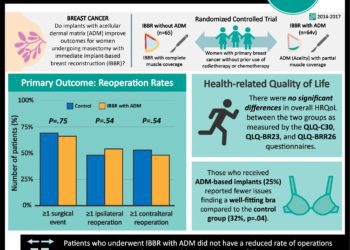Long-term safety of silicone gel breast implants is unclear
1. From a systematic review, the associations between silicone gel breast implants (SGBI) and long-term health outcomes are often not adequately adjusted for confounders, show no association, and/or their findings are too heterogeneous.
2. Based on this limited evidence, SGBI may be associated with decreased risk of breast and endometrial cancer and increased risk of lung cancer, rheumatoid arthritis, Sjogren’s syndrome and suicide.
Evidence Rating Level: 1 (Excellent)
Study Rundown: Silicone gel breast implants (SGBI) were removed from the market in 1992 amid concerns by the FDA that insufficient safety data had been provided by manufacturers. SGBI returned to market in 2006 after reviews of the evidence showed no association with disease, and the aim of this study was to understand the long-term health outcomes of SGBI. From this systematic review, most diseases showed no association with SGBI. Notably, women with SGBI might be associated with reduced risk of having breast and endometrial cancer and an increased risk of lung cancer, though poor adjustment for confounders makes these results questionable. Links between SGBI and cancers of the blood, cervix, brain or vulva were either not statistically significant or showed no association. The authors found that because few studies were adequately adjusted, the overall association between SGBI and many connective tissue diseases could not be assessed. Meta-analyses found an association between SGBI and increased risk of rheumatoid arthritis and Sjogren’s syndrome, however adjustment for confounders was poor. All six studies that evaluated links with suicide found higher rates in women with SGBI, however the two studies with adequate adjustment were not statistically significant. Overall, the results were largely inconclusive, as the evidence lacked consistency in its associations or demonstrated a high degree of heterogeneity.
Click to read the study published today in the Annals of Internal Medicine
Relevant Reading: Breast cancer detection and survival among women with cosmetic breast implants: systematic review and meta-analysis of observational studies
In-Depth [systematic-review]: This study included all longitudinal studies investigating the long-term health outcomes of women with SGBI compared to women without implants, with saline breast implants, or women having other cosmetic procedures. Of the 197 articles reviewed, 32 studies met eligibility criteria and encompassed implants placed between 1964 and 2003 with follow-up ranging from 1 to 27 years. There was no link between SGBI and many clinical entities, specifically Raynaud syndrome, neurologic disease, reproductive and offspring issues, and depression. Most of the studies included in this systematic review lacked adequate adjustment of confounders. With the aforementioned in mind, the evidence pointed toward a significant association between women with SGBI and reduced risk of developing breast cancer (standardized incidence ratio or SIR 0.76, 95%CI 0.64 –0.91) and endometrial cancer (adjusted RR 0.55, 95%CI 0.38 – 0.78; SIR estimate 0.44; p < 0.05). Results of studies looking at the link with lung cancer were heterogeneous, but a poorly defined meta-analysis showed an increased association among women with SGBI (SIR 1.82, 95%CI 1.37 – 2.42). Additional meta-analyses conducted within the study demonstrated statistically significant associations between SGBI and increased risk of rheumatoid arthritis (effect size or ES 1.38, 95%CI 1.06 – 1.80) and Sjogren’s syndrome (ES 2.92, 95%CI 1.01 – 8.47). Duration of follow-up was not associated with any significant difference in associations after meta-regression.
Image: CC/Wiki
©2015 2 Minute Medicine, Inc. All rights reserved. No works may be reproduced without expressed written consent from 2 Minute Medicine, Inc. Inquire about licensing here. No article should be construed as medical advice and is not intended as such by the authors or by 2 Minute Medicine, Inc.








